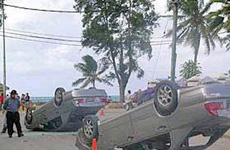
There have been riots in Tonga. The Salvation Army Headquarters was set on fire because it was part of a property belonging to a king.
Good on the Tongans I say.
Evil, oppression and an unjust system has reigned in that kingdom too long.
The disparities between the arisocrats and the commoners are severe. The chosen rich (royal family members) live in mansions eating luxuries, while the non-rich have not a glimpse of hope to access resources. Commoners are not even permitted to own land. For years people have tried to negotiate more democratic processes to no avail. It has never reached boiling point because the last King was a kind man. The new king is the opposite: on coming in to power he declared control over state owned assets. Yesterday the people cracked, buildings were burnt down, cars over turned, six people died in the turmoil.
Christians seem to be tut tutting all over the place today about this shocking news. I admit, Violence is never, ever great. But if democracy gets a foot in the door through this course of events then surely its worth it?
I pray these riots will form part of a greater Kingdom's ethos of equality and justice.


5 comments:
I struggle with this one. I doubt the six people who died even knew the king let alone wanted to die for the cause of democracy. I suspect those killing them were not that bothered about democracy either but these situations often give a good excuse for lawlessness (having lived in Northern Ireland for a few years I have witnessed this first hand!). Was the king that bothered that a few cars and building got destroyed? I doubt it.
There are examples around the world where a peoples quiet revolution has toppled dictatorships and I would much prefer to see this form of protest being deployed. I accept that it doesnt always come easily and can be at great cost but I do believe it has a much greater impact.
I join you in praying for equality and justice for this nation. How this is achieved is another thing. Anyway, it is always good to debate and reflect on these things so thanks for bringing this to our attention.
Hey Howard, yep, good points. You have to wonder whether the six families thought it was a fair sacrifice.
However, I think it was a genuine motivation for change, rather than a chance to be lawless. The six people who died were caught up in fires etc, (the intention was never murder)fires that were started as real forms of protest. Of course then some drunkards did come aong and made it worse but the majority were serious about what they wanted to achieve.
And as for the King, I think he really would care about what has happened. The Tongans (I have heard) are a peaceful, laid back people and this would have been a dramatic wake up call for him. The riots certainly sent a stark message for the king about the peoples unrest and desire for change.
I would always hold peaceful resistance as the ultimate in protest. But, I also think that when passive methods and negotiations have been used for years to no avail, there comes a crunch time. I think that time is very rare, normally things can be sorted through non-violent means, but sometimes some tables - or cars- need to be turned over.
Malo e lelei.
So my thoughts...
No matter what, I still can't condone the violence. I highly doubt that years of 'passive protest' without result would have turned people like Martin Luther King to turn to violence to get their voices heard, and I cannot see how God would support violent demonstrations.
Whether or not murder was intentional recently in Tonga, people are still dead as a result of fires deliberately lit. I strongly disapprove of those actions.
I do support the people of Tonga being ruled in the way that they want, and if they want democracy instead of monarchy, then they should be heard on that. I agree also that the disparity between rich and poor in Tonga must be addressed - these are God's people, after all - but there are better ways to do this.
Anyway, from what I have seen and heard of the new Tongan king, I don't know if this violence would help the Tongan people attain what they wanted. I hope it hasn't made it harder for the people of Tonga.
A final thought: Martin Lurther King said once that "moral change is not accomplished through immoral means."
Food for thought.
I can't seem to see it as unflinchingly clear as you guys.
How does that MLK quote stand in front of Dietrich Bonhoeffers attempt to assasinate Hitler?
We view Bonhoeffer as a martyr, a hero of the faith. He was executed for violently opposing the Nazi regime.
Does it have to be a reeeeeaalllly evil thing to be met with violent response? How do we judge if something is evil enough? Most of Bonhoeffers fellow Christians thought he was off his rocker.
And what about all those Christians that joined the Army voluntarily to oppose the Nazi Regime? We generally view them as courageous... Is that because there was a formal, legal side to their participation in violence? It was sort of validated through their presence in an istitution like the military?
Where as we view the Tongans as scallywags, because either the King isn't quite evil enough, or they exist outside of an acceptable institution?
These are just some questions that prevent my ability to to see it so clean cut!
I think the MLK example is a bad one for two reasons. For one thing, I wouldn’t call King’s form of demonstration as passive. The guy, and those involved with his cause, illegally parked themselves in coffee shops, sat in the front of busses, boycotted public transportation, and marched through city streets. True, they met violence with non violence, but it wasn’t passive and it was very illegal. Second, King was living and demonstrating in a country who’s constitution made it possible to fight injustice without violence. Furthermore, he had a large population of people, both black and white, who were willing to participate in his non-violent form of protest.
I think a better example would be Native Americans or the indigenise populations of any area that was colonized. Would anybody blame those people for fighting back? In fact, people did blame Native Americans for fighting back. In retrospect, however, I think most of us would agree that Native Americans should have fought a little harder. Or what about African slaves in America? Are there any of us who would look back on that time and think it would have been wrong of those people to fight for their freedom using violent means? Certainly God used violent means and allowed His children to use violent means when it came to oppression.
I realize that there are different levels of oppression. Certainly I would not condone violence in addressing the oppression that is taking place in our church right now. But I also would not judge others in different situations who feel it there only way out. Oppression breeds violence.
Post a Comment